How Realtors Can Receive Buyer Inquiries Without Using Their Personal Cell
Realtors can keep buyer inquiries professional without exposing their personal cell. Discover how Supa Dial makes it easy to manage client calls and protect your privacy.

In real estate, every call could mean a new lead, but using your personal phone number for buyer inquiries isn’t always the best move. From open house flyers to Zillow listings, your number can quickly end up in the hands of hundreds of strangers. That’s why many agents are looking for ways to receive buyer inquiries without using their personal cell.
According to the National Association of Realtors (NAR), all home buyers begin their home search online, which makes keeping your personal number private more important than ever.
A second phone line provides the flexibility realtors need. It helps you stay accessible to serious buyers while protecting your privacy, presenting a professional image, and managing calls more efficiently.
With Supa Dial, you can activate a business-ready number instantly and handle inquiries from your mobile, laptop, or browser, without juggling an extra SIM card or device.
In this guide, we’ll cover why realtors benefit from a second number, the types of solutions available, and how Supa Dial makes it simple to stay reachable while keeping your personal cell private.
Why Realtors Need a Second Number for Buyer Inquiries
Handling buyer inquiries is one of the most critical parts of being a realtor—but relying on your personal cell for this can quickly become overwhelming. A second line gives you the control and professionalism you need to manage leads effectively.
Protect Your Privacy & Personal Number
When you publish your number on listing sites, yard signs, or social media ads, it becomes public property. That means anyone—buyers, tire-kickers, spammers, or even competitors—can reach you directly.
A second number creates a protective layer, ensuring only your business line is visible while your personal cell stays private. This prevents unwanted follow-ups long after a property has sold.
Project a Professional Image
First impressions matter in real estate. A dedicated business line lets you set up a professional voicemail greeting, use a local area code that resonates with buyers, and separate personal chatter from property inquiries.
Buyers feel more confident contacting an agent who provides a polished, business-ready number rather than a personal cell. This small step can increase credibility and trust during the earliest stages of contact.
Manage Boundaries Between Work and Life
Buyer inquiries don’t follow a 9–5 schedule, which means calls can come in late at night, on weekends, or during family time. With a second number, you control when those calls come through by silencing, forwarding, or redirecting them outside business hours.
This helps you stay responsive to clients while protecting your personal time from constant interruptions.
Handle High Inquiry Volume
A hot listing can attract dozens of calls in a single day. Mixing those with personal texts and family group chats makes it easy to overlook serious buyers. A second number keeps all property-related calls in one place, making it easier to log inquiries, return calls quickly, and prioritize qualified leads.
Some providers even offer call analytics or voicemail-to-email, helping you capture every opportunity without missing a beat.
[Infographic placeholder: “Top 4 Reasons Realtors Use a Second Number for Buyer Inquiries” – privacy, professionalism, work-life balance, lead management]
Types of Second Numbers Realtors Can Use
Realtors don’t need to give out their personal cell numbers to every buyer who calls. With modern tools, you can set up a second line that keeps business and personal life separate. Here are the most common options available to real estate professionals.
Virtual Phone Numbers
Virtual phone numbers operate over the internet rather than a physical SIM card. For realtors, this means you can publish a dedicated number on listings, yard signs, and business cards, while answering inquiries directly on your smartphone, laptop, or even tablet.
Many providers allow you to choose local area codes, which helps build trust with buyers who prefer working with agents in their community. Advanced features like voicemail-to-email, call forwarding, and analytics also make it easier to manage a high volume of property inquiries without losing track of serious leads.
Temporary or Disposable Numbers
Sometimes you need a number only for a specific property or short-term campaign. Temporary numbers work well when running limited-time ads, posting open house flyers, or listing a rental property on platforms like Craigslist.
Once the campaign ends, you can retire the number and stop unwanted calls from lingering. This prevents your personal cell from being tied to properties that have already sold or tenants who no longer need you.
Disposable numbers are also useful when screening early-stage leads, allowing you to separate serious buyers from casual inquiries before committing your main business line.
Encrypted Messaging Apps With Call Features
Realtors who work with high-net-worth buyers, corporate relocations, or international clients may prefer this extra layer of privacy. Encrypted apps also make it easier to communicate securely when sharing contracts, IDs, or sensitive details during the buying process.
By attaching your Supa Dial second line to these apps, you can extend that protection to client calls and texts, keeping conversations separate from your personal phone while ensuring professional confidentiality.
REALTORS®—bound by both legal obligations and the NAR Code of Ethics—are encouraged to uphold data privacy and security as part of their duty to clients and public trust
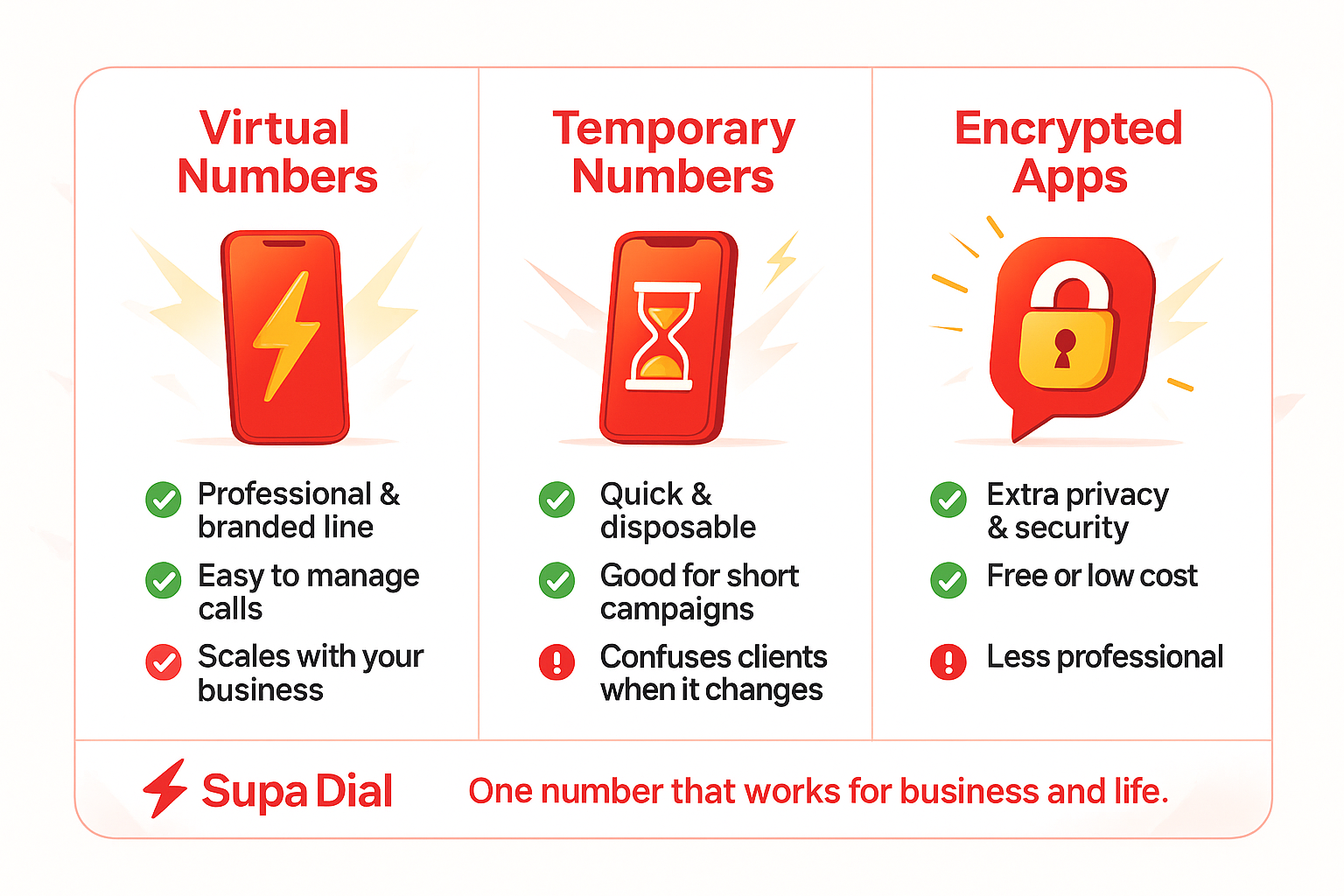
Side-by-Side Comparison of Popular Second Number Providers
Realtors handle high call volumes, late-night inquiries, and constant follow-ups. The right second line provider should balance affordability, local presence, and tools that make managing buyer and seller calls easier. Here’s how top providers compare:
How to Choose the Right Provider for Realtors
Not all second number services meet the unique demands of real estate. Agents juggle dozens of leads, weekend showings, and high-value transactions, so the right provider must support professionalism, flexibility, and security. Here are the factors realtors should weigh before choosing a second line.
Pricing & Value
Cost is important, but it should be measured against long-term usability. A very low-cost plan may lack voicemail, call forwarding, or text features that agents rely on when responding to buyers.
Paying slightly more for a service that includes these essentials can actually save money and time in the long run. Supa Dial offers tiered plans that allow solo agents to start small and scale up as inquiries grow, making it easier to adapt to changing business needs.
Features
Realtors need features that match the fast pace of property sales. Voicemail-to-email ensures you never miss a message from a buyer, while call screening helps filter out spam or robocalls.
Some providers also allow custom greetings, which adds professionalism when new leads call your line. Choosing a provider with tools that fit your daily workflow prevents lost opportunities and keeps buyer conversations running smoothly.
Integrations
Real estate agents often rely on CRMs like Follow Up Boss, LionDesk, or Zoho to manage leads. A second number service that integrates with these tools helps you automatically log calls and track follow-ups.
This saves time, reduces manual data entry, and ensures every lead is accounted for. While not all providers offer integrations, those that do make it easier for agents to maintain consistency across multiple platforms.
Call Volume
Hot listings can trigger dozens of calls in just a few hours. If your provider limits minutes or charges steep overages, this can become costly fast. Supa Dial’s scalable plans allow agents to increase capacity when needed, making it easier to handle seasonal spikes in call volume.
Estimating your typical inquiry load will help you choose a plan that won’t leave you scrambling when interest peaks.
Privacy & Security
Realtors handle sensitive information, from pre-approval letters to personal buyer details. A trustworthy provider should offer encryption and strong account protections to ensure these communications stay private.
Even one breach can damage your reputation and client trust. Supa Dial uses encrypted connections and secure account management to help realtors maintain both privacy and professionalism.
How to Set Up Your Realtor Number with Supa Dial
Getting a second number for real estate doesn’t require juggling two phones or SIM cards. With Supa Dial, you can activate a dedicated line in minutes and start handling buyer inquiries professionally. Here’s how to set it up:
1. Visit SupaDial.com and Sign Up or Log In
Head over to the Supa Dial website to create an account. The signup process is quick and requires just a few basic details. If you’re already registered, log in to your dashboard, where you can manage all your numbers, plans, and call settings. This single portal becomes the control center for your real estate communications.
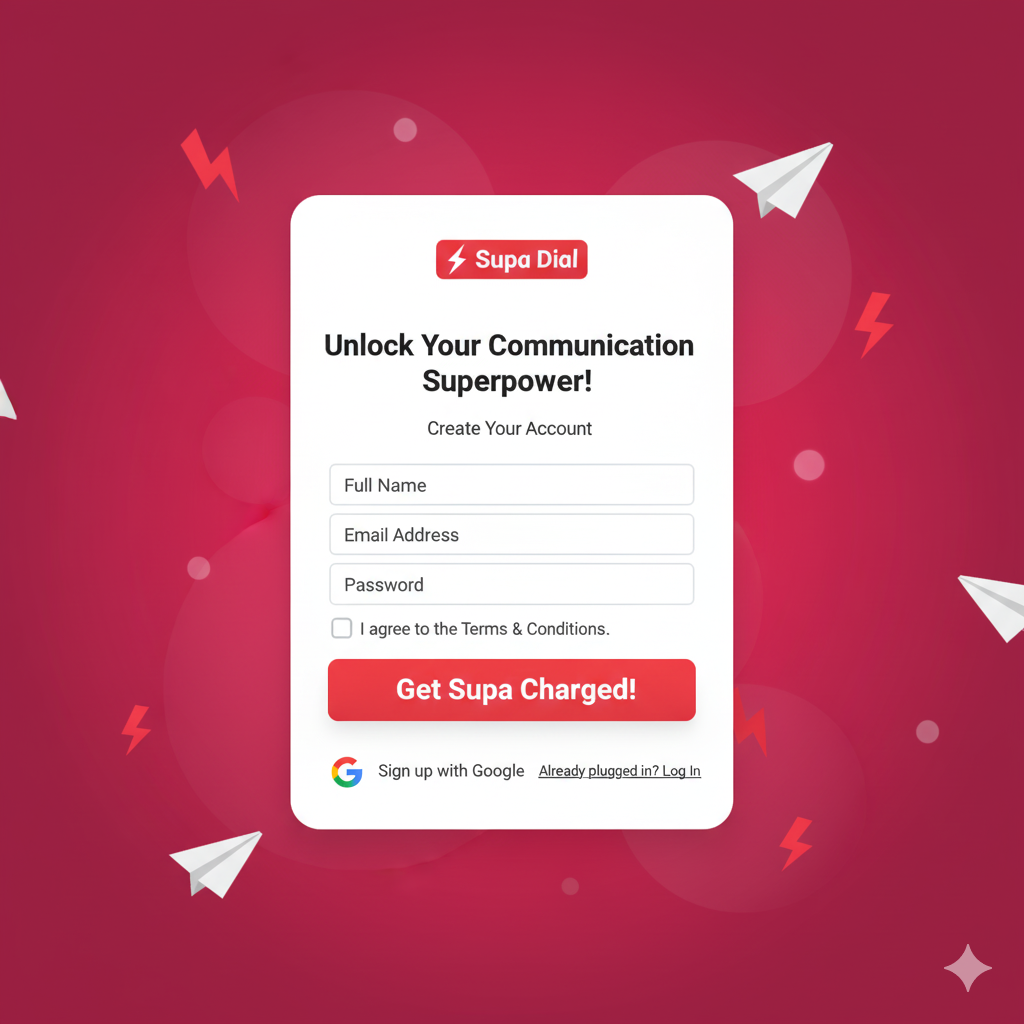
2. Choose Your Preferred Number
Select a number that best matches your market. Realtors can pick local numbers with area codes familiar to buyers, or even choose toll-free numbers for broader campaigns. Having a business-specific number adds credibility and makes buyers more comfortable reaching out. Supa Dial lets you change or add numbers later if you expand into new neighborhoods or regions.
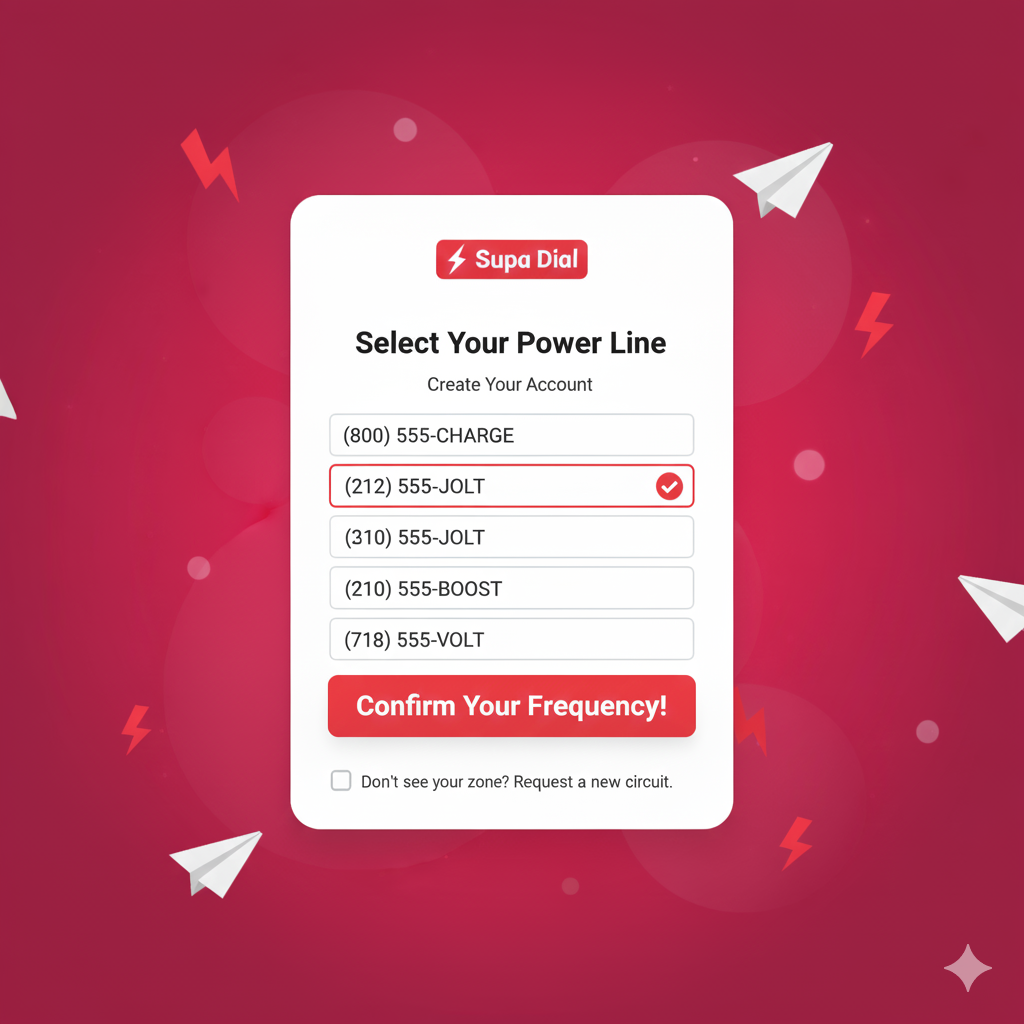
3. Pick Your Plan
Different realtors have different communication needs. If you’re handling just a few listings, a basic plan may be enough to cover calls and texts. For busy seasons or high-volume agents, advanced plans include unlimited calls and added tools like browser calling or voicemail-to-email.
Supa Dial’s flexible pricing means you only pay for the level of service that fits your business today, with room to scale tomorrow.
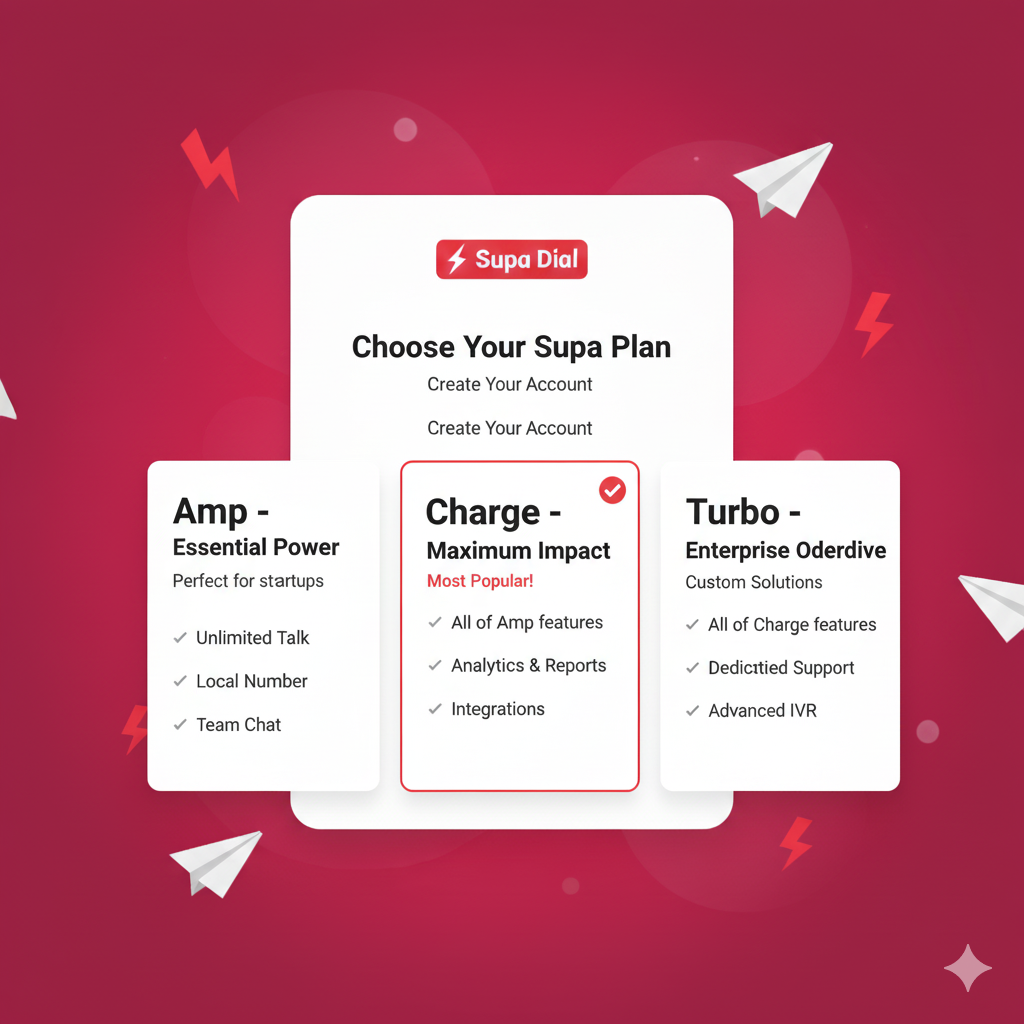
4. Configure Your Settings
Personalize your line to fit your real estate workflow. Set up a professional voicemail greeting so new leads know they’ve reached your business line. Create call forwarding rules to route inquiries to team members during open houses, or direct after-hours calls to voicemail. These settings ensure you never miss a serious buyer inquiry while still protecting your personal time.
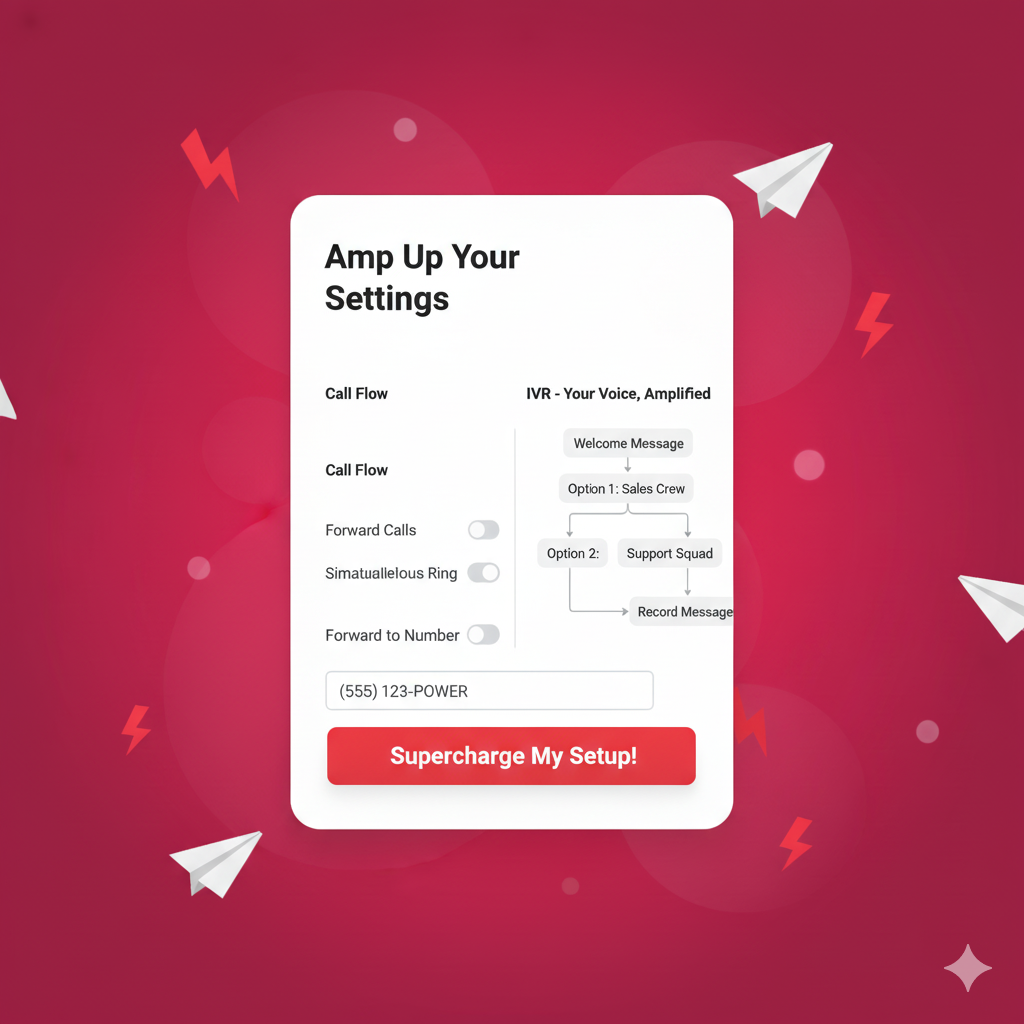
5. Complete Payment and Activate Your Number
Once your plan and preferences are set, confirm your payment details to activate your number. The process is instant. No SIM card swaps or carrier visits required. Within minutes, your dedicated realtor number is live and ready for incoming buyer inquiries. This speed means you can start using your new line the same day you sign up.
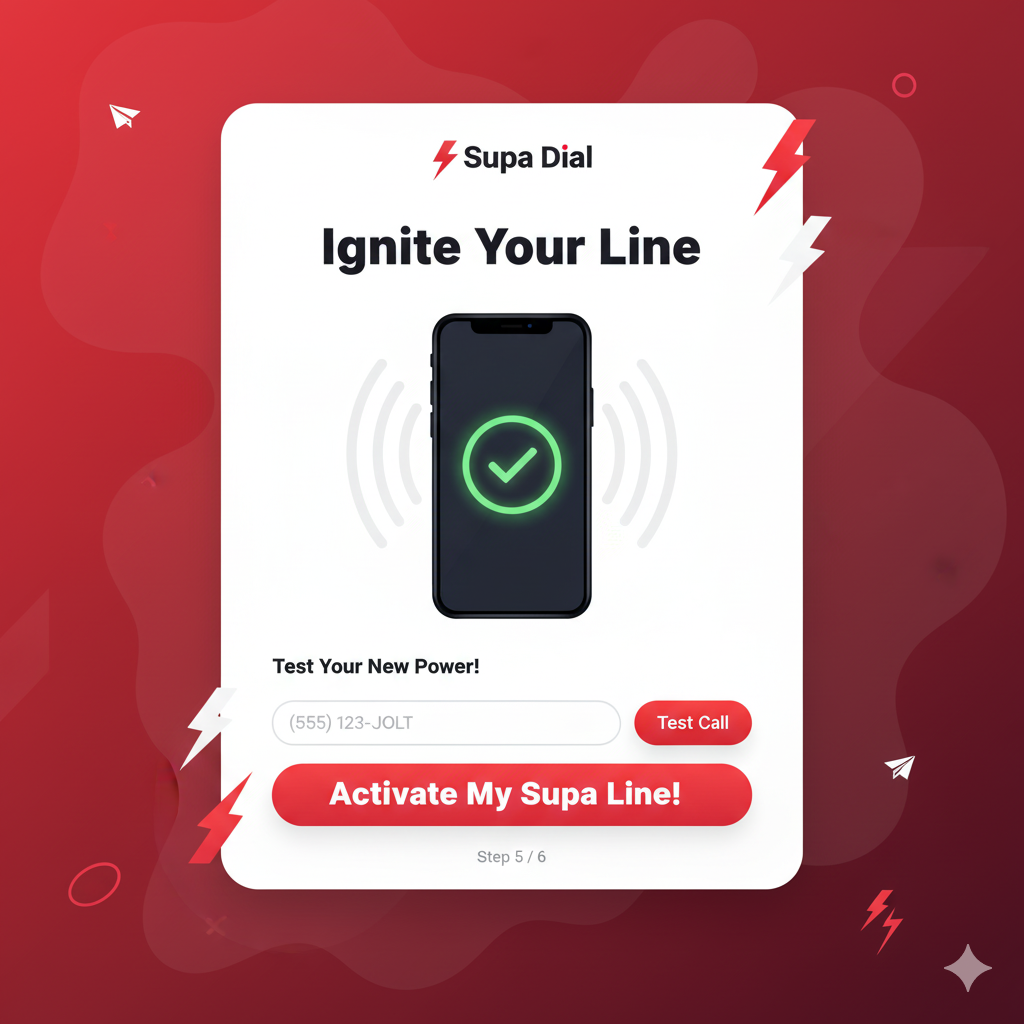
6. Add Your Number to Listings and Marketing Materials
The final step is to put your new number to work. Add it to your MLS listings, business cards, property flyers, and online profiles on platforms like Zillow, Trulia, and Realtor.com. This ensures buyers see a professional contact number dedicated solely to real estate. By keeping your personal cell private, you maintain clear boundaries while staying accessible to every potential lead.

💡 Pro Tip: Use Supa Dial’s browser-based calling to return buyer inquiries from your laptop while updating listings, so you can multitask efficiently without reaching for your phone.
Security & Privacy Best Practices for Realtors Using a Second Line
A second phone line keeps buyer inquiries separate from your personal cell, but protecting client communications requires more than just switching numbers. Realtors are trusted with sensitive information, from financial pre-approvals to personal identification documents.
Following these best practices helps you safeguard data, preserve professionalism, and maintain client trust.
Choose a Reputable Provider
Not every service offering a “free” or “cheap” second line takes security seriously. A reputable provider should use encryption, minimize data collection, and comply with telecom standards. Realtors risk damaging their reputation if client communications are exposed through an insecure platform.
Choosing a provider like Supa Dial with proven protections ensures that both you and your clients remain confident in the security of your interactions.
Enable Two-Factor Authentication (2FA)
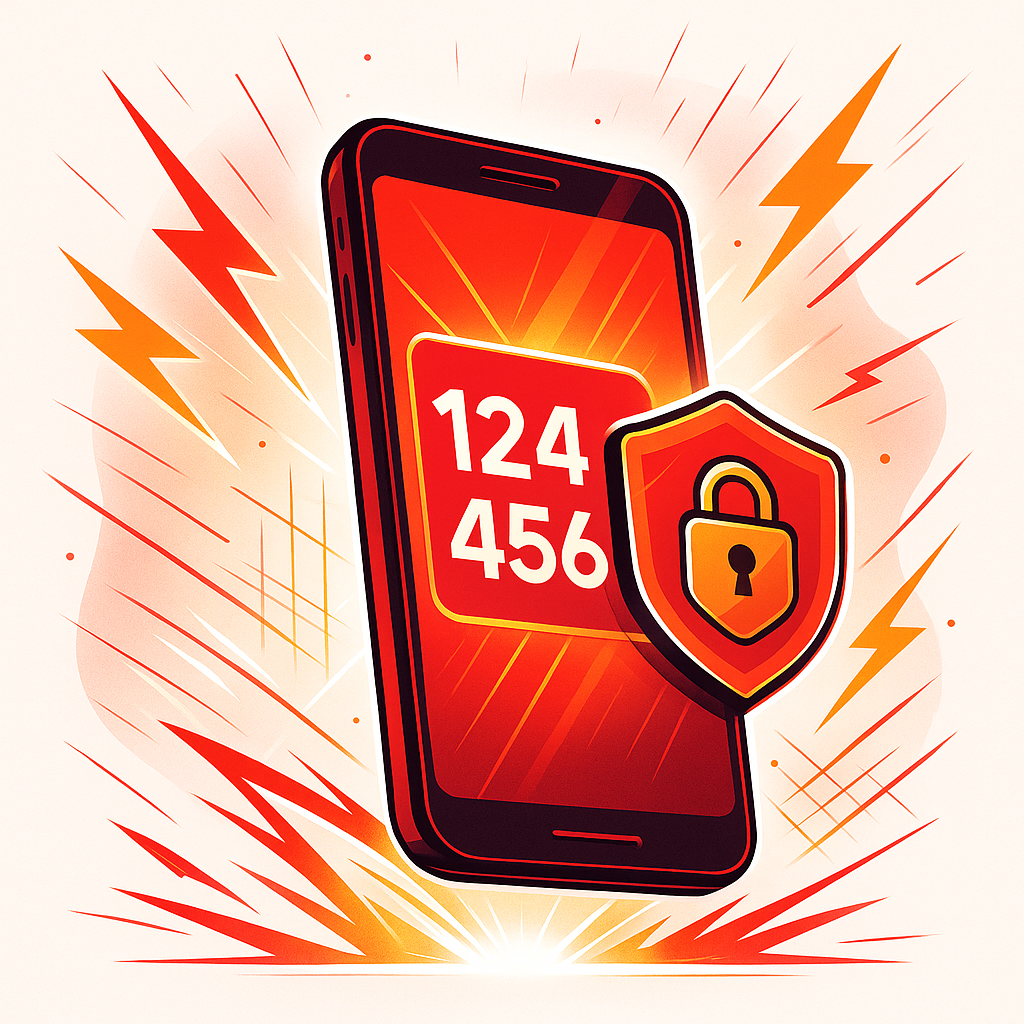
Two-factor authentication adds an extra security layer by requiring a code from a separate device or app, not just a password. According to Microsoft, 2FA blocks over 99% of automated attacks, making it one of the simplest yet most effective protections available.
Realtors handling multiple listings, contracts, and buyer data should always enable 2FA to prevent unauthorized access.
Avoid Unknown Free Apps
Some free calling or messaging apps generate revenue by selling user data or running invasive ads. Others may lack proper encryption, putting buyer and seller conversations at risk.
For realtors, where trust and confidentiality are critical, using unknown apps could create liability issues. It’s safer to stick to reputable services that clearly state how they protect data.
Keep Your App Updated
Hackers often target outdated apps that no longer receive security patches. Updates don’t just add new features; they close vulnerabilities that attackers exploit. Realtors who delay updates risk exposing client communications to potential breaches.
By enabling automatic updates, you ensure your second line always has the latest protections in place, reducing the risk of disruption during busy sales periods.
Review Permissions Regularly
Apps may request access to your contacts, location, or files, but not all of these permissions are necessary. Limiting access reduces the chance of exposing sensitive buyer information if the app is ever compromised.
Realtors should periodically review app permissions and disable those not essential to daily operations. This helps keep client details private and under your control.
Log Out from Shared Devices
If you use your business line on a shared office computer or tablet, always log out when finished. Leaving an account open risks exposing client conversations or sensitive property details to others.
You should avoid “remember me” logins on shared devices and clear saved credentials whenever possible. This simple step helps prevent breaches and maintains the professional integrity of your communications.
Legal Considerations for Realtors Using a Second Line
Realtors are trusted with client data and must operate within strict legal and ethical frameworks. While a second line helps maintain privacy, it’s important to understand the regulations that govern how calls, texts, and client information are handled.
Consent for Call Recording
Recording calls can be valuable for documenting buyer conversations or clarifying property details, but laws vary by state and country. Some jurisdictions require only one-party consent (you), while others require all participants to agree.
Failing to comply can result in penalties or legal disputes. Realtors should always check state-specific call recording laws before enabling this feature.
(Source: Federal Communications Commission)
Real Estate Advertising Regulations
Most state real estate commissions regulate how agents advertise properties, including what must appear on signs, websites, and online listings. If you publish your second line on marketing materials, you must also include required disclosures such as your brokerage name or license number.
Using a virtual number is allowed, but it must still comply with state advertising laws and NAR’s Code of Ethics.
(Source: NAR Code of Ethics)
Do-Not-Call (DNC) Registry Compliance
Cold calling is common in real estate prospecting, but every number you use must comply with the National Do Not Call Registry. This includes checking contacts against the DNC list, respecting time-of-day restrictions, and honoring opt-out requests. A second line does not exempt you from compliance, so it’s essential to train your team and maintain updated lists.
(Source: Federal Trade Commission)
Recordkeeping & Disclosure Obligations
Many states require realtors to maintain records of communications for three to seven years. This can include text messages, emails, and call logs tied to a transaction.
If you’re using a second line, choose a provider that allows you to archive or export these records. Proper recordkeeping ensures compliance during audits and protects you in case of client disputes.
(Source: NAR: Record Retention)
Data Protection and Privacy Regulations
Client data, from mortgage pre-approvals to personal identification, is protected under privacy laws like GDPR in Europe and CCPA in California. Realtors handling this information must ensure their provider uses secure systems for calls, texts, and stored data.
Supa Dial supports compliance with privacy frameworks, helping agents protect sensitive information shared during buyer and seller communications.
(Sources: European Commission, State of California DOJ)
Ready to Upgrade How You Handle Buyer Inquiries?
If you’re still using your personal cell for buyer inquiries, you may be exposing yourself to privacy risks, compliance issues, and missed opportunities. A second line helps you keep personal and business life separate, maintain professionalism, and comply with industry rules.
Supa Dial gives realtors the flexibility to handle buyer calls securely while following advertising, privacy, and recordkeeping requirements. With instant setup and features tailored for busy agents, it’s the simplest way to protect your personal number and capture more leads.
Frequently Asked Questions
Still have questions about using a second line for real estate? Here are quick answers for agents managing buyer inquiries.
What is a second phone line for realtors?
It’s a dedicated number you use for property inquiries, separate from your personal cell. This keeps buyer communications professional and private.
Can I advertise my second line on signs and listings?
Yes, but state advertising rules apply. Always include required details like your brokerage name or license number when publishing your second line.
How do Do-Not-Call (DNC) rules affect a second line?
DNC rules apply to every phone number you use. Realtors must check contacts against the registry and honor opt-out requests, even when calling from a second line.
Do I need to keep records of calls and texts from my second line?
Yes. Many states require realtors to retain transaction-related communications for 3–7 years. Choose a provider like Supa Dial that allows you to export logs or voicemails for compliance.
Are calls and messages secure on a second line?
That depends on the provider. Services with encryption and strong privacy controls help protect sensitive client data, ensuring buyer trust and legal compliance.
